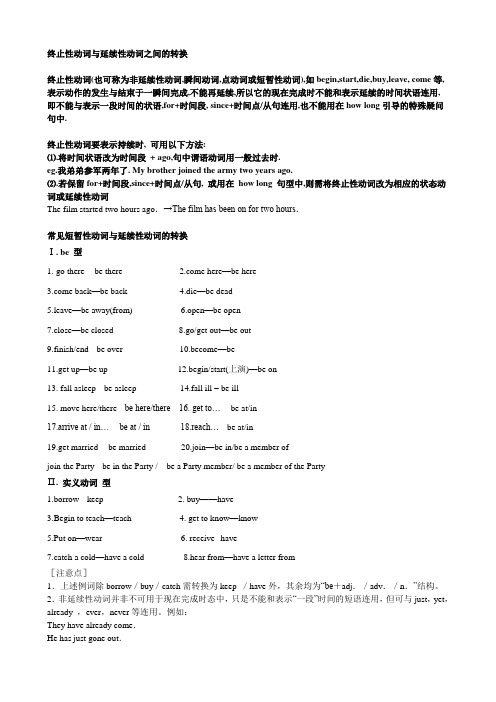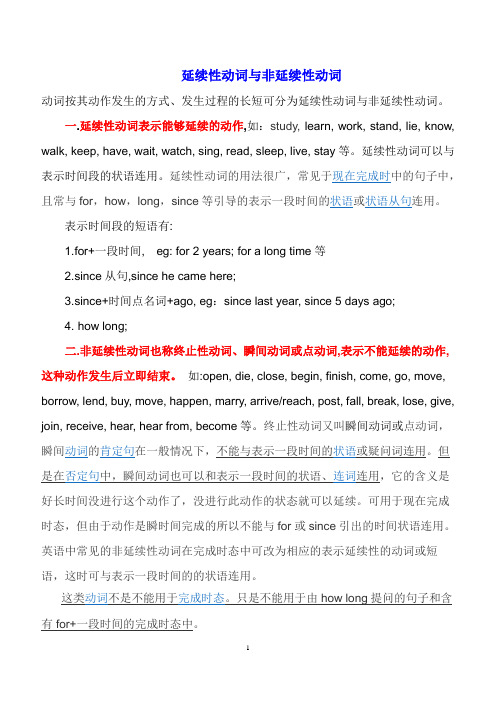延续性动词与非延续性动词的区分及其转换附练习和答案
中考英语延续性与非延续性动词复习

中考英语延续性与非延续性动词复习(一)概念不同:
1.延续性动词形容能够延续的一段动作。
2.非延续性动词表示的动作不能延续,动作在某个时间点发生。
(二)用法不同:
1.延续性动词在现在完成时的句子中使用,与表示"一段时间"的状语一起用。
延续性动词不能与表示某个时间点的"点时间"状语连用。
eg:I have learned Chinese since I came here.自从我来到这儿就学汉语了。
2.终止性动词可以表示已经完成的动作,因此可用于现在完成时。
终止性动词表示的动作很短暂,不能延续,则不能与表示时间延续的状语连用。
eg:It is five days since he came to China. 他来中国已经五天了。
现在完成时的延续性动词与非延续性动词

现在完成时的延续性动词与非延续性动词1. 动词按其动作发生的方式、发生过程的长短可分为延续性动词与非延续性动词(短暂性动词或瞬间动词)。
延续性动词可以与表示时间段的状语连用。
表示时间段的短语有: ⑴for+一段时间,如: for 2 years; ⑵since从句, 如since he came here; since+过去时间点,如since last year, since 5 days ago。
非延续性动词也称终止性动词、瞬间动词, 表示不能延续的动作,这种动作发生后立即结束。
在现在完成时的肯定句中,短暂性动词不能与表示时间段的for短语,since短语或从句连用。
也不能与表示时间段的how long 引起的疑问句连用。
例如:(1) I have bought the book for 2 weeks. ( x )I have bought the book. (√)I have bought the book since two weeks ago. ( x )I have bought the book two weeks ago. ( x )I have had the book for two weeks. (√)(2) The old man died 4 years ago.=The old man has been dead for 4 years.It is/has been 4 years since the old man died.Four years has passed since the old man died.2. 短暂性动词与延续性动词的转换:(1) go (to)/ come (to)/arrive/get to/reach/move---be in/at become---be return/go back/come back---be back例如:He arrived in Beijing ten minutes ago.= He has been in Beijing for ten minutes.My sister became an engineer in 2005.= My sister has been an engineer since 2005.They went to Shanghai yesterday.= They have been in Shanghai since yesterday/for one day.(2) open---be open close---be closed die----be dead marry---bemarried get married---be married leave--- be away finish/end---be over begin/start---be on go to sleep/fall asleep--- be asleep fall ill---be illget up---be up sit down---be seated go to school --- be a student例如:He left five minutes ago. = He has been away for five minutes.The film began ten minutes ago. = The film has been on since ten minutes ago.(3) buy---have borrow/lend---keep/have catch a cold---have a coldput on---wear get to know---know begin to study---study例如:She bought this book last year. = She has had this book since last year.(4) join--- be in/ be a member of…+the 组织机构/be a组织机构memberjoin the Party =be in the Party=be a Party member=be a member of the PartyJoin the army=be in the army=be a solider 参军He joined the League in 2013.He has been in the League since 2013.He has been a member of the League since 2013. He has been a League member since 2013.It is three years since he joined the League.。
英语延续动词与非延续动词的转换

英语延续动词与非延续动词的转换补充练习:()1. When he arrived at the bus stop, the bus ________ for 20 minutes.A. has leftB. had leftC. has been awayD. had been away()2. I ______ the League for 5 years so far.A. joinedB. have joinedC. have been in()3. The factory ________ since the February of 1988.A . has been open B. has opened C. was open D. opened()4. Mary and Rose _______friends since they met in 2000.A. have madeB. have beenC. madeD. have become()5.You mustn't ________ until he comes back.A. be awayB. leaveC. be left()6.The meeting _______ for a week now.A. has finishedB. has endedC. has been over()7.Miss Gao ______ this school for nearly 5 years.A. has been inB. has come toC. has taught()8.Ben ______ a teacher for 4 years .A. has beenB. has becomeC. wasD. became()9. I ______ home for a week.A. have returnedB. have been backC. returned()10. How long _______ he ________ ?A. diedB. has, diedC. has, been dead()11. He ______ at eight yesterday afternoon.A. sleptB. was sleepingC. has sleepD. had slept()12.He ________ the car for a week.A. boughtB. has boughtC. has had()13.-----How long _____ you _____ ill ? -----Two weeks.A. did fallB. have, fellC. have, been()14.Since 2000, he _____ his hometown.A. has leftB. has moved awayC. has been away from()15.I'll lend you the book , but you can only _____ it for 2 days.A. borrowB. keepC. take()16.The bus ______ on the road for 2 hours so far.A. has stoppedB. stoppedC. has been()17.Are you _____ the jacket these days?A. wearingB. putting onC. dressingD. on()18.He ________ foe 2 hours.A. got upB. has got upC. has been up()19. Tom is ill in hospital. He _______ a cold for several days.A. isB. catchesC. has caughtD. has had()20.----- How long can I ______ the book? ------ Two weeks.A. borrowB. lendC. getD. keep。
(完整版)延续性动词和非延续动词转换和练习(精华)

终止性动词与延续性动词之间的转换终止性动词(也可称为非延续性动词,瞬间动词,点动词或短暂性动词),如begin,start,die,buy,leave, come等,表示动作的发生与结束于一瞬间完成,不能再延续,所以它的现在完成时不能和表示延续的时间状语连用,即不能与表示一段时间的状语,for+时间段, since+时间点/从句连用,也不能用在how long引导的特殊疑问句中.终止性动词要表示持续时, 可用以下方法:⑴.将时间状语改为时间段+ ago,句中谓语动词用一般过去时.eg.我弟弟参军两年了. My brother joined the army two years ago.⑵.若保留for+时间段,since+时间点/从句, 或用在how long 句型中,则需将终止性动词改为相应的状态动词或延续性动词The film started two hours ago.→The film has been on for two hours.常见短暂性动词与延续性动词的转换Ⅰ. be 型1. go there -- be theree here—be heree back—be back4.die—be dead5.leave—be away(from)6.open—be open7.close—be closed 8.go/get out—be out9.finish/end-- be over 10.become—be11.get up—be up 12.begin/start(上演)—be on13. fall asleep-- be asleep 14.fall ill – be ill15. move here/there --be here/there 16. get to… --be at/in17.arrive at / in… -- be at / in 18.reach…-- be at/in19.get married --be married 20.join—be in/be a member ofjoin the Party-- be in the Party / be a Party member/ be a member of the PartyⅡ. 实义动词型1.borrow-- keep2. buy——have3.Begin to teach—teach4. get to know—know5.Put on—wear6. receive--have7.catch a cold—have a cold 8.hear from—have a letter from[注意点]1.上述例词除borrow/buy/catch需转换为keep /have外,其余均为“be+adj./adv./n.”结构。
(完整版)延续性动词与非延续性动词总结(含练习)

延续性动词与非延续性动词动词按其动作发生的方式、发生过程的长短可分为延续性动词与非延续性动词。
一.延续性动词表示能够延续的动作,如:study, learn, work, stand, lie, know, walk, keep, have, wait, watch, sing, read, sleep, live, stay等。
延续性动词可以与表示时间段的短语有:1.for+一段时间, eg: for 2 years; for a long time等2.since从句,since he came here;3.since+时间点名词+ago, eg:since last year, since 5 days ago;4. how long;二.非延续性动词也称终止性动词、瞬间动词或点动词,表示不能延续的动作,这种动作发生后立即结束。
如:open, die, close, begin, finish, come, go, move, borrow, lend, buy, move, happen, marry, arrive/reach, post, fall, break, lose, give,常见的这类动词有:go, come, leave, arrive, lose, land, catch, join, kill, find 等。
例如:1. He has joined the club for a long time. ( 错)2. He has been a member of the club for a long time. ( 对)3. His grandfather has died for over 30 years. ( 错)4. His grandfather has been dead for over 30 years. ( 对)【注意】之所以将这些动词称为瞬间动词,是因为这些动词在眨眼之间发生并终结。
延续性与非延续性动词在现在完成时态中的使用

延续性与非延续性动词在现在完成时态中的使用
延续性动词和非延续性动词在现在完成时态中的使用有一些区别。
1.延续性动词:
延续性动词表示持续的动作或状态,常见的有live(住)、work
(工作)、study(学习)、wait(等待)等。
在现在完成时态中,延续
性动词通常用来表示一个动作或状态开始于过去,持续到现在,并且可能
会继续下去。
例如:
- I have lived in this city for 10 years.(我在这个城市住了
10年了。
)
2.非延续性动词:
非延续性动词表示瞬间动作或不可数的状态,常见的有arrive(到达)、die(死亡)、finish(完成)、know(知道)等。
在现在完成时
态中,非延续性动词通常用来表示一个动作已经完成或一个状态已经发生,没有持续的时间。
例如:
- She has arrived at the airport.(她已经到达了机场。
)
- The project has finished.(项目已经完成了。
)
- I have known him since childhood.(我从小就认识他了。
)
需要注意的是,有些动词既可以是延续性动词,也可以是非延续性动词,根据上下文来决定其使用方式。
比如,动词sleep(睡觉)可以是延
续性动词,表示持续的睡眠状态,也可以是非延续性动词,表示一次性的睡眠动作。
延续性动词和非延续性动词的练习题

延续性动词和非延续性动词的练习题练题一:选择正确的动词填空1. My sister ___________ a book in her room. (read / reads)2. We ___________ dinner together every evening. (eat / eats)3. They ___________ to music in the living room. (listen / listens)4. Tom ___________ basketball in the park. (play / plays)5. She ___________ a beautiful song at the concert. (sing / sings)6. The children ___________ to school by bus. (go / goes)7. My parents ___________ their anniversary last week. (celebrate / celebrates)8. He ___________ TV in the living room. (watch / watches)练题二:改写下列句子,使用正确的延续性动词或非延续性动词1. I'm smelling the flowers in the garden.- I ___________ the flowers in the garden. (smell)2. She's hearing a strange noise in the attic.- She ___________ a strange noise in the attic. (hear)3. We're seeing a movie tonight.- We ___________ a movie tonight. (see)4. They're tasting the new recipe.- They ___________ the new recipe. (taste)5. He's touching the soft fabric.- He ___________ the soft fabric. (touch)练题三:判断下列句子中的动词是延续性动词还是非延续性动词1. She is running in the park.- 是延续性动词 (延续性动词)2. They are talking about their vacation plans.- 是延续性动词 (延续性动词)3. The baby is crying loudly.- 是延续性动词 (延续性动词)4. He is thinking about his future career.- 是延续性动词 (延续性动词)5. The students are studying for their exams.- 是延续性动词 (延续性动词)请根据以上练习题进行练习,巩固对延续性动词和非延续性动词的理解。
完整版)延续性动词和非延续动词转换和练习(精华)

完整版)延续性动词和非延续动词转换和练习(精华)本文讲述了终止性动词与延续性动词之间的转换。
终止性动词指的是动作的发生与结束于一瞬间完成,无法再延续。
因此,现在完成时不能与表示延续的时间状语连用,也不能用在how long引导的特殊疑问句中。
如果需要表示持续,可以将时间状语改为时间段+ ago,谓语动词用一般过去时;或者将终止性动词改为相应的状态动词或延续性动词。
在实际应用中,常见的短暂性动词与延续性动词的转换包括be型和实义动词型。
例如,go there可以转换为be there,come here可以转换为be here,finish/end可以转换为be over,get married可以转换为be married等等。
这些转换可以帮助我们更准确地表达动作的状态和持续时间。
1.Borrowing means temporarily taking something from someone else。
while keeping something means having n of it permanently。
Similarly。
buying something means acquiring it for good。
while having something means already possessing it。
2.Instead of saying "begin to teach," we can simply say "teach."3.Getting to know someone means ing acquainted with them。
while knowing someone means already having a nship with them。
4.Putting on clothes means dressing oneself。
- 1、下载文档前请自行甄别文档内容的完整性,平台不提供额外的编辑、内容补充、找答案等附加服务。
- 2、"仅部分预览"的文档,不可在线预览部分如存在完整性等问题,可反馈申请退款(可完整预览的文档不适用该条件!)。
- 3、如文档侵犯您的权益,请联系客服反馈,我们会尽快为您处理(人工客服工作时间:9:00-18:30)。
延续性动词与非延续性动词的区分及其转换附练习和答案
动词按其动作发生的方式、发生过程的长短可分为延续性动词与非延续性动词。
一.延续性动词表示能够延续的动作,如:learn, work, stand, lie, know, walk, keep, have, wait, watch, sing, read, sleep, live, stay等。
延续性动词可以与表示时间段的状语连用。
表示时间段的短语有:for+一段时间,for 2 years; since从句,since he came here; since+时间点名词,since last year, since 5 days ago; how long; for a long time等。
例:He has lived here for 6 years. You can keep the book for 5 days. I stayed there for 2 weeks last year. How long did you stay there last year?
二.非延续性动词也称终止性动词、瞬间动词,表示不能延续的动作,这种动作发生后立即结束。
如:open, die, close, begin, finish, come, go, move, borrow, lend, buy等。
非延续性动词在肯定句中与表示时间点的状语连用,如:two years ago; at 5 o'clock;
例:He died 5 years ago.
否定的终止性动词可以与表示时间段的时间状语连用。
例:I haven't left here for 3 years.
I haven't heard from him for 3 weeks.
三.延续性动词与非延续性动词之间的转换:leave --- be away, borrow --- keep, buy --- have, begin/start --- be on, die --- be dead, finish --- be over, join --- be in+组织机构, be a member of+组织机构, open sth --- keep sth open, fall ill --- be ill, get up---be up, catch a cold --- have a cold, come here --- be here, go there --- be there, become --- be, come back --- be back, fall asleep --- be asleep, get to/ arrive/reach --- be (in), leave --- be away from, get to know --- know, go (get) out →be out,put on→ wear;catch a cold →have a cold等。
例:The old man died 4 years ago. ----The old man has been dead for 4 years. ---- It is 4 years since the old man died. ----Four years has passed since the old man died. He joined the Party 2 years ago. -----He has been in the Party for 2 years. I bought the book 5 days ago. ---- I have had the book for 5 days.
补充练习:
1.When he arrived at the bus stop, the bus ________ for 20 minutes.
A. has left
B. had left
C. has been away
D. had been away
2. I ______ the League for 5 years so far.
A. joined
B. have joined
C. have been in
3.The factory ________ since the February of 1988.
A . has been open B. has opened C. was open D. opened
4.Mary and Rose _______friends since they met in 2000.
A. have made
B. have been
C. made
D. have become
5.You mustn't ________ until he comes back.
A. be away
B. leave
C. be left
6.The meeting _______ for a week now.
A. has finished
B. has ended
C. has been over
7.Miss Gao ______ this school for nearly 5 years.
A. has been in
B. has come to
C. has taught
8.Ben ______ a teacher for 4 years .
A. has been
B. has become
C. was
D. became
9. I ______ home for a week.
A. have returned
B. have been back
C. returned
10. How long _______ he ________ ?
A. died
B. has, died
C. has, been dead
11. He ______ at eight yesterday afternoon.
A. slept
B. was sleeping
C. has sleep
D. had slept
12.He ________ the car for a week.
A. bought
B. has bought
C. has had
13.-----How long _____ you _____ ill ? -----Two weeks.
A. did fall
B. have, fell
C. have, been
14.Since 2000, he _____ his hometown.
A. has left
B. has moved away
C. has been away from
15.I'll lend you the book , but you can only _____ it for 2 days.
A. borrow
B. keep
C. take
16.The bus ______ on the road for 2 hours so far.
A. has stopped
B. stopped
C. has been
17.Are you _____ the jacket these days?
A. wearing
B. putting on
C. dressing
D. on
18.He ________ foe 2 hours.
A. got up
B. has got up
C. has been up
19. Tom is ill in hospital. He _______ a cold for several days.
A. is
B. catches
C. has caught
D. has had
20.----- How long can I ______ the book? ------ Two weeks.
A. borrow
B. lend
C. get
D. keep
Key:
1---5 D C A B B; 6---10 C A A B C; 11---15 B C C C B; 16---20 C A C D D。
